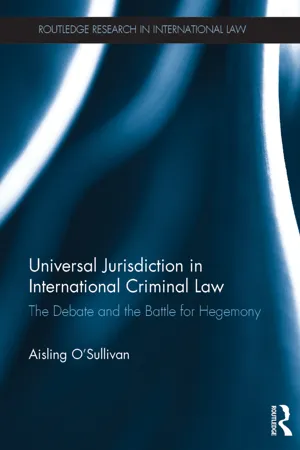![]()
p.8
1 The politics of international law
When we explore the debate surrounding the principle of universal jurisdiction in international criminal law, there appears to be intractable dichotomies at play. We observe competing positions over the justification for the principle that appear to pull from normative order or state liberty and produce multiple interpretations that range from rejecting to accepting the ‘validity’ of the principle.1 The debate over the presence of the offender as a prerequisite to exercising jurisdiction has been contentious, as is evident in the separate and dissenting opinions in the International Court of Justice’s Arrest Warrant case.2 Similarly, the debate surrounding the immunity of state officials before foreign courts has produced competing legal outcomes in national courts.3 There are opposing positions within the case law regarding the crimes over which universal jurisdiction can be asserted by states.4 Numerous studies have produced different interpretations over the justification and content of the principle5 and these multiple interpretations are more recently reflected in the United Nations General Assembly debates.6 Seeking to make sense of these seemingly endless oppositions, scholars have captured the debate in terms of a binary naturalism-positivism dichotomy7 or as a tripartite structure with two diametrically opposed positions and a middle ground.8 Nevertheless, these studies are underpinned by one of the basic tenets of liberal rule of law: the concept of legal objectivity vis-à-vis political subjectivity.
p.9
In contrast, this book employs certain techniques drawn from Martti Koskenniemi’s ‘multiple points of thought’ to deconstruct these seemingly competing legal positions.9 This reads international law as a language system and uses an image of a deep structure (or grammatical rules) in international legal argument to illustrate legal style, that is, ‘how the legal mind, in some special moment, navigates the field of legal materials’.10 This illustration of legal style captures the internal inconsistency of the arguments and the capacity to deploy competing yet interdependent doctrinal styles that represent the formal conditions of possibility of legal argument. This approach simultaneously reads international law as a ‘site of politics’11 that illustrates how, rather than ‘anything goes’, legal outcomes accord with structural biases of institutions. These techniques of rule indeterminacy and structural bias are employed in later chapters to capture how the legal debate appears to be a movement of hegemonic and non-hegemonic positions, struggling for (‘hegemonic’) control, which ultimately tends towards a ‘middle ground’ position. Therefore, in this chapter, we explore the techniques of Koskenniemi’s of rule indeterminacy, hegemonic positions and structural bias of institutions.
1 Generalizing the language model and its critique
Approaching international law as rhetorical technique draws on the Harvard School, which interrogates legal practice ‘from the inside’.12 This aims to make sense of ‘one of the ways in which we experience law [which] is as a medium in which one pursues a project rather than as something that tells us what we have to do’.13 This medium is a ‘complex argumentative practice’ where international lawyers (as the competent language speakers) connect rules with other rules ‘at different levels of abstraction’.14 In this way, the approach of the Harvard School corresponds to approaches in other disciplines that generalize the language model of Saussure’s semiotics and thus, view ‘complex social phenomena’ as akin to language in the sense of having the same internal structure.15 Therefore, such approaches presuppose then that there is ‘no more reliable access to those worlds [of physics and medicine] than what is provided by the languages of physics or medicine as spoken by the competent language-speakers of those disciplines’.16 Similarly, there is ‘no access to legal rules or the legal meaning of international behaviour that is independent from the way competent lawyers see those things’17 and international law ‘is what lawyers think about it and how they go about using it in their work’.18 Accordingly, a ‘particular utterance called legal argument’ can be explored using the generalization of the language model. This academic style draws upon insights from Saussure’s binaries and Derrida’s deconstruction that breaks and displaces the binaries. We briefly explore these latter insights before turning to the legal literature. However, it is necessary to be mindful that as each critique has in general been the subject of critique, it undermines any claim by the critiques ‘to get at the truth of the objects they represent’.19 Instead of some possibility of a resolution, the competing critiques are in a ‘complex relationship of mutual critique’, each attacking the other.20
p.10
Saussure proposed sets of distinctions that he theorized from exploring the condition of spoken language in general (synchronic), rather than historical changes over time (diachronic).21 One set of distinctions is the division of spoken language into an essential system that is a ‘self-contained whole’ (langue) and everything else after the essential system is abstracted (parole).22 This means language is ‘a vast network of differences where each word has a value that is determined by...
